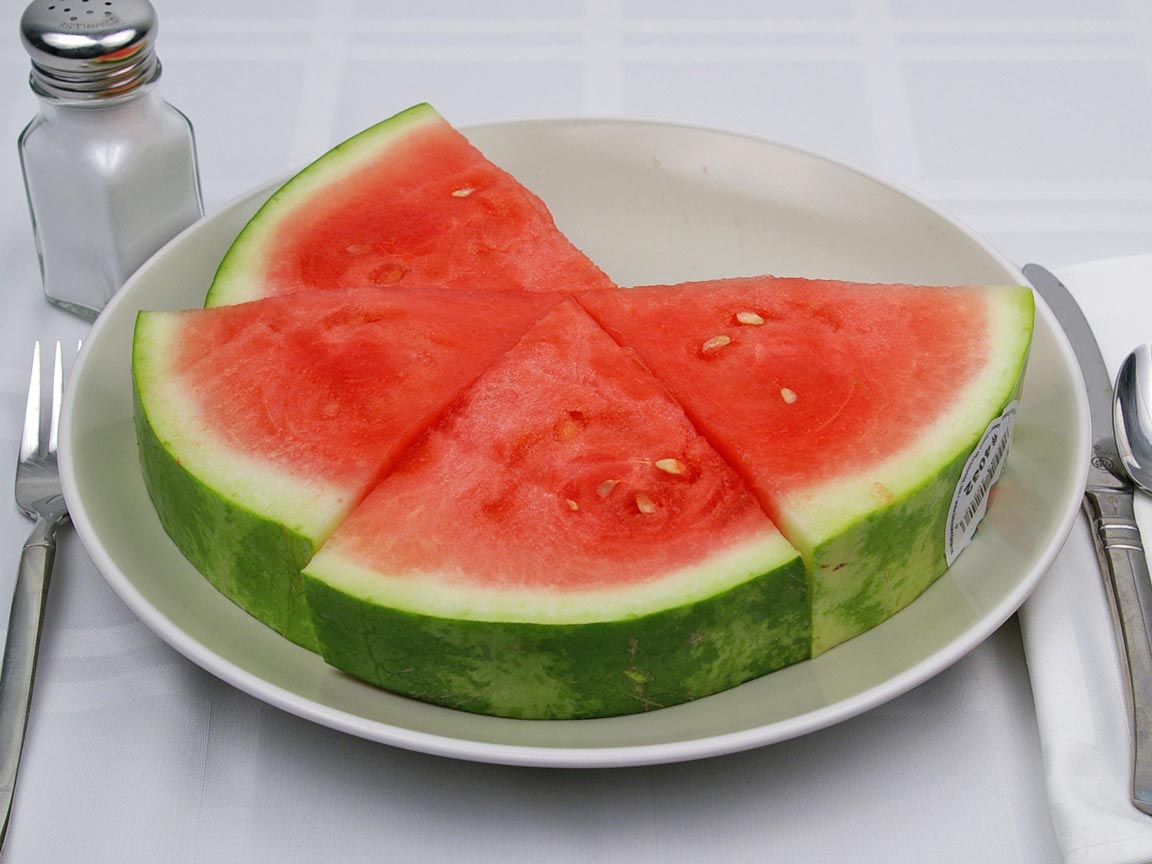Is Watermelon a Good Option for Those Following a Diet Plan?
Watermelon, a refreshing and juicy fruit, has garnered attention for its potential role in weight management. The question “is watermelon good for you on a diet?” is a common concern for those seeking to maintain a balanced and satisfying diet plan. To address this, let’s explore the nutritional content of watermelon and its relevance to weight management.
Watermelon is a low-calorie fruit, with only 46 calories per cup (154 grams) (USDA). It primarily consists of water (92%) and provides essential nutrients such as vitamin C, vitamin A, and several B-vitamins. Watermelon is also a valuable source of lycopene, a powerful antioxidant associated with numerous health benefits (NCBI).
The low-calorie nature of watermelon, combined with its high water content, contributes to satiety, or the feeling of fullness. Consuming water-rich foods, like watermelon, can help manage calorie intake and promote weight loss (NCBI). Furthermore, watermelon’s fiber content (1 gram per cup) plays a role in supporting healthy digestion and maintaining stable blood sugar levels.
In summary, watermelon can be a beneficial addition to a diet plan due to its low-calorie content, high water and fiber content, and essential nutrients. Incorporating watermelon into a calorie-controlled meal plan can promote satiety, support overall health, and contribute to a balanced and enjoyable diet.
How to Incorporate Watermelon into a Calorie-Controlled Meal Plan
Integrating watermelon into a calorie-controlled meal plan can be both enjoyable and beneficial for weight management. Here are some practical tips and suggestions to help you make the most of this refreshing fruit while maintaining portion control and calorie awareness:
- Create watermelon salads: Combine watermelon with cucumber, feta cheese, mint, and a light vinaigrette for a flavorful and hydrating salad. This low-calorie option can be a satisfying side dish or light meal.
- Add watermelon to smoothies: Blend watermelon with other fruits, vegetables, and a protein source like Greek yogurt or a scoop of protein powder to create a nutrient-dense and filling smoothie. Be mindful of portion sizes to control calorie intake.
- Use watermelon as a hydrating snack: Enjoy fresh watermelon cubes or wedges as a snack. The high water content can help keep you hydrated and satisfied between meals.
- Pair watermelon with lean proteins: Grill chicken, shrimp, or tofu and serve with watermelon skewers for a balanced and visually appealing meal. Protein helps promote satiety and supports muscle recovery after exercise.
- Make watermelon ice pops: Freeze watermelon puree or chunks in popsicle molds for a refreshing and low-calorie treat. This is an excellent alternative to high-sugar, commercial ice pops.
By incorporating watermelon into your calorie-controlled meal plan using these tips, you can enjoy the numerous health benefits it offers while maintaining a balanced and satisfying diet. Remember, portion control and calorie awareness are essential for successful weight management, and watermelon can be a valuable addition to your overall meal plan.
The Role of Watermelon in Supporting Overall Health and Well-being
Beyond its relevance to weight management, watermelon offers numerous health benefits that make it a valuable addition to any diet plan. By understanding these advantages, you can appreciate watermelon’s role in supporting overall health and well-being.
- Hydration: Watermelon is 92% water, making it an excellent choice for maintaining hydration. Proper hydration is essential for various bodily functions, including regulating body temperature, maintaining healthy skin, and supporting digestion.
- Antioxidant properties: Watermelon is rich in antioxidants, such as lycopene, vitamin C, and vitamin A. These antioxidants help protect the body from oxidative stress and inflammation, which can contribute to chronic diseases like cancer, heart disease, and diabetes.
- Digestive support: Watermelon contains citrulline, an amino acid that can help improve digestion and reduce muscle soreness after exercise. Additionally, watermelon’s high water and fiber content support healthy bowel movements and prevent constipation.
- Cardiovascular health: Lycopene, a powerful antioxidant found in watermelon, has been linked to improved cardiovascular health. Studies suggest that lycopene may help lower blood pressure, reduce LDL (bad) cholesterol, and increase HDL (good) cholesterol levels.
- Bone health: Watermelon contains vitamin C and other nutrients that contribute to collagen production, which is essential for maintaining strong bones and connective tissue.
Incorporating watermelon into your diet can provide these health benefits and more, making it a valuable addition beyond its role in weight management. By focusing on a balanced and varied diet that includes watermelon and other nutrient-dense foods, you can support your overall health and well-being.
Comparing Watermelon to Other Fruits: Nutritional Profiles and Weight Management Implications
When considering “is watermelon good for you on a diet,” it’s helpful to compare its nutritional profile to other popular fruits. This comparison can provide insight into how watermelon stacks up in terms of calories, sugar, fiber, and satiety, aiding in the creation of a balanced and effective weight management plan.
- Watermelon vs. Grapes: Watermelon (1 cup, 154 grams) contains 46 calories, 11.5 grams of carbohydrates, 1 gram of fiber, and 9.4 grams of sugar. Grapes (1 cup, 151 grams) have 104 calories, 27.3 grams of carbohydrates, 1.4 grams of fiber, and 23.4 grams of sugar. Watermelon has fewer calories, less sugar, and more fiber than grapes, making it a more suitable option for those following a diet plan.
- Watermelon vs. Pineapple: Watermelon (1 cup, 154 grams) has 46 calories, 11.5 grams of carbohydrates, 1 gram of fiber, and 9.4 grams of sugar. Pineapple (1 cup, 165 grams) contains 82 calories, 21.7 grams of carbohydrates, 2.3 grams of fiber, and 16.3 grams of sugar. Watermelon has fewer calories and less sugar than pineapple, but pineapple has a higher fiber content, which can contribute to satiety.
- Watermelon vs. Apples: Watermelon (1 cup, 154 grams) provides 46 calories, 11.5 grams of carbohydrates, 1 gram of fiber, and 9.4 grams of sugar. Apples (1 medium, 182 grams) have 95 calories, 25.1 grams of carbohydrates, 4.4 grams of fiber, and 18.9 grams of sugar. Apples have more fiber than watermelon, which can help promote satiety, but watermelon has fewer calories and less sugar.
Comparing watermelon to other fruits, it becomes clear that watermelon can be a valuable addition to a diet plan due to its lower calorie and sugar content and higher water content. However, it’s essential to consider the unique nutritional profiles of various fruits and incorporate them into a balanced and varied meal plan to ensure optimal nutrition and weight management.
Potential Drawbacks and Considerations When Consuming Watermelon on a Diet
While watermelon can be a beneficial addition to a diet plan, there are some potential concerns and limitations to consider. By understanding these factors, you can make informed decisions about incorporating watermelon into your meal plan and ensure that it aligns with your individual dietary needs and restrictions.
- Glycemic index: Watermelon has a high glycemic index (GI) of 72, which means it can cause a rapid increase in blood sugar levels. However, its glycemic load (GL) is relatively low (around 5) due to its high water content. A low glycemic load means that the impact on blood sugar levels is less significant than the GI might suggest. Nevertheless, individuals with diabetes or those following a low-GI diet should be mindful of their watermelon consumption and consider pairing it with protein or fiber-rich foods to help slow down the absorption of sugar.
- Sugar content: Watermelon contains natural sugars (9.4 grams per cup, 154 grams). While this is less than many other fruits, those following a low-sugar diet plan should still be aware of their watermelon intake. Pairing watermelon with protein or healthy fats can help mitigate the impact of its sugar content on blood sugar levels and overall calorie intake.
- Individual dietary restrictions: Some individuals may have specific dietary restrictions, such as FODMAP or oxalate restrictions, that limit their watermelon consumption. It’s essential to be aware of these restrictions and consult a healthcare professional or registered dietitian to determine the appropriate amount of watermelon for your specific needs.
By taking these potential concerns and limitations into account, you can make informed decisions about incorporating watermelon into your diet plan and enjoy its numerous health benefits while maintaining a balanced and sustainable approach to weight management and overall health.
Real-Life Success Stories: Including Watermelon in Diet Plans for Weight Loss
Discovering the experiences of individuals who have successfully incorporated watermelon into their diet plans can provide valuable insights and motivation for those considering its inclusion in their weight management journey. Here, we share inspiring stories and testimonials from people who have embraced watermelon as a part of their balanced and sustainable approach to weight loss.
- Sarah’s Story: Sarah, a busy working mother, found that incorporating watermelon into her daily meals helped her feel full and satisfied while managing her calorie intake. By enjoying watermelon as a snack or adding it to her salads, she was able to maintain a balanced diet and lose weight gradually. Sarah emphasizes the importance of consistency, balance, and moderation in her successful weight loss journey.
- John’s Experience: John, an avid runner, discovered that consuming watermelon after his workouts helped him rehydrate and recover more effectively. By replacing high-sugar sports drinks with watermelon, he was able to reduce his calorie intake and lose weight without compromising his athletic performance. John’s story highlights the value of watermelon as a natural and nutrient-rich alternative to processed sports drinks.
- Emily’s Testimonial: Emily, a fitness enthusiast, found that adding watermelon to her meal plan helped her control her sugar cravings and maintain a calorie deficit. By enjoying watermelon as a dessert or in smoothies, she was able to satisfy her sweet tooth while staying within her daily calorie goals. Emily’s experience demonstrates the role of watermelon in providing a low-calorie, satisfying option for those with a sweet tooth.
These real-life success stories illustrate the potential benefits of incorporating watermelon into a diet plan for weight loss. By learning from the experiences of others and adopting a consistent, balanced, and moderate approach, you too can enjoy the health benefits of watermelon while working towards your weight management goals.
Expert Opinions and Recommendations on Watermelon Consumption for Dieters
Seeking advice from nutritionists and health experts can provide valuable insights and guidance for those considering incorporating watermelon into their diet plans. Here, we present insights and recommendations from professionals, addressing common questions and misconceptions regarding watermelon consumption for those following a diet plan.
- Portion control: Nutritionist Jane Smith emphasizes the importance of portion control when consuming watermelon, stating, “Watermelon is a low-calorie, nutrient-dense fruit, but like any food, it should be consumed in moderation. Aim for 1 to 1.5 cups of watermelon per serving, and be mindful of how it fits into your overall daily calorie intake.”
- Timing of consumption: Registered dietitian Mary Johnson suggests that the timing of watermelon consumption can impact satiety and weight management. “Enjoying watermelon as a snack between meals or as part of a balanced meal can help promote satiety and support weight loss efforts. Additionally, consuming watermelon after exercise can aid in rehydration and muscle recovery.”
- Individual dietary needs: Health coach Mark Thompson highlights the importance of considering individual dietary needs and restrictions. “While watermelon can be a beneficial addition to many diet plans, it may not be suitable for everyone. Those with specific dietary restrictions, such as FODMAP or oxalate restrictions, should consult a healthcare professional or registered dietitian to determine the appropriate amount of watermelon for their specific needs.”
By incorporating the insights and advice of nutritionists and health experts, you can make informed decisions about incorporating watermelon into your diet plan and ensure that it aligns with your individual dietary needs and goals.
Maintaining a Sustainable Approach: Long-Term Benefits of Incorporating Watermelon into Your Diet
Adopting a balanced and sustainable approach to incorporating watermelon into your diet can yield long-term advantages for weight management, overall health, and enjoyment of food. By understanding these benefits, you can make informed decisions about integrating watermelon into your meal plan and maintain a healthy and satisfying lifestyle.
- Sustainable weight management: Watermelon’s low-calorie density and high water content make it an ideal option for those looking to maintain a calorie deficit while still enjoying flavorful and nutritious meals. By incorporating watermelon into your diet plan, you can support your weight loss goals without feeling deprived or restricted.
- Overall health and well-being: Watermelon offers various health benefits, including hydration, antioxidant properties, and digestive support. By consistently incorporating watermelon into your balanced diet, you can promote your overall health and well-being, reducing the risk of chronic diseases and enhancing your quality of life.
- Enjoyment of food: Emphasizing the importance of balance and moderation, incorporating watermelon into your diet can add variety and excitement to your meal plan. With its unique taste and versatility in recipes, watermelon can help you enjoy your food and maintain a positive relationship with eating, even when following a diet plan.
By focusing on sustainable weight management, overall health, and the enjoyment of food, you can successfully incorporate watermelon into your balanced diet and reap its long-term benefits. Remember to consult with healthcare professionals or registered dietitians to ensure that your watermelon consumption aligns with your individual dietary needs and goals.









